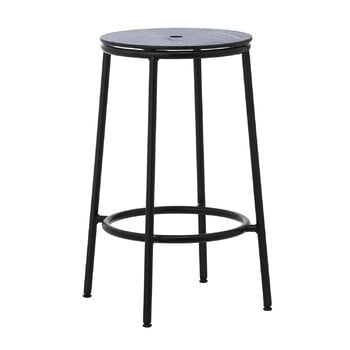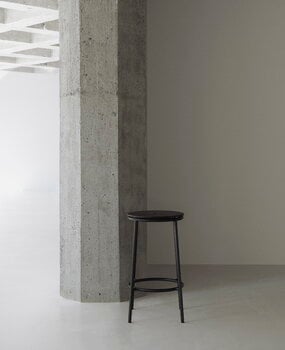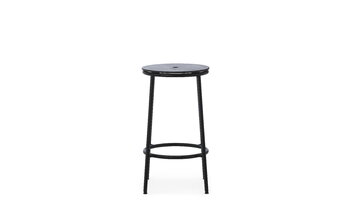Normann Copenhagen's Circa is a minimalist and timeless bar stool consisting of a slender steel tube frame and a black lacquered oak veneer seat. Designed by Simon Legald, the stool gets its name from the round elements: the circular shape is repeated in the seat, the rounded footrest as well as the hole in the middle of the seat, which makes it easy to carry the stool from one place to another. The classic but contemporary Circa bar stool fits well next to the kitchen island, around the dining table or as extra seating for surprise guests.
Circa bar stool, 65 cm, black steel - black oak
Normann Copenhagen
Description
Normann Copenhagen's Circa is a minimalist and timeless bar stool consisting of a slender steel tube frame and a black lacquered oak veneer seat. Designed by Simon Legald, the stool gets its name from the round elements: the circular shape is repeated in the seat, the rounded footrest as well as the hole in the middle of the seat, which makes it easy to carry the stool from one place to another. The classic but contemporary Circa bar stool fits well next to the kitchen island, around the dining table or as extra seating for surprise guests.
Product details (7)
- Colour
- Black
- Height
- 65 cm
- Diameter
- 37 cm
- Seat height
- 65 cm
- Seat material
- Black lacquered oak veneer
- Base material
- Powder coated steel
- Weight
- 5.4 kg
- Product ID
Designer
Simon Legald (b. 1986) is a Danish designer and Head of Design at Normann Copenhagen. Graduating from the Royal Danish Academy of Fine Arts in 2012, Legald began his long and productive collaboration with Normann Copenhagen shortly after. His designs blend traditional craftsmanship with industrial techniques, focusing on modern simplicity and a precise balance between functionality and visual aesthetics. One of Legald's best-known works is the Form chair collection, which received the iF Design Award in 2016.
View all productsReviews (1)
5
Based on 1 reviews
-
A
anonyymi
Espoo, Finland
Paras baarijakkara, jolla olen koskaan istunut!
90 days ago
Sustainability
The Product Sustainability Framework, our criteria of sustainable design, helps you find the most sustainable products in our selection. Read below which sustainability criteria this product has met.
Working conditions & labour 7/9
-
Equal opportunities for all employees
-
Commitment to UN Global Compact, fair compensation for all employees
-
Corporate responsibility requirements defined and communicated for suppliers
-
Systematic work for improved inclusion and well-being in the workplace
-
Transparent supply chain
-
Suppliers' compliance to a code of conduct ensured
-
Compliance to the UN Guiding Principles on Business and Human Rights ensured in the supply chain
-
Direct suppliers audited and certified
-
Support for community involvement in the supply chain
Eco-friendly production 6/9
-
Fair and resource-wise water-use in production
-
No incineration or landfilling of returned items
-
No use of endangered species as materials
-
No direct environmental emissions or waste (excl. GHGs) from production
-
Material-efficient and ecological packaging
-
No potentially harmful chemicals used in own production
-
The sustainability of direct suppliers' production is addressed and monitored
-
Production and material sourcing that respect biodiversity, animal rights, and natural ecosystems
-
Positive impact on nature’s well-being through operations that regenerate natural ecosystems
Climate impact 4/8
-
Company's direct greenhouse gas emissions identified and commitment to reduction
-
Product's carbon impact identified and commitment to reduction
-
Guidance on energy- and eco-efficient use of the product
-
Contribution to climate initiatives beyond the brand’s direct operations
-
Low-carbon or compensated transportation
-
Carbon footprint of the product calculated and goals set to reduce it
-
100 % renewable energy in own production and operations
-
Carbon neutral or carbon negative product
Sustainable materials 3/6
-
Sustainable and long-lasting material choices
-
No harmful or hazardous substances
-
Responsible raw material sourcing and production
-
Materials suited for circularity: monomaterials, recyclable finishings, renewable or recycled contents etc.
-
Ecological materials: natural, biodegradable, recyclable or recycled contents
-
Outstanding materials in terms of innovativeness, responsibility, sustainability and circularity: local production or sourcing, 100 % recycled content, C2C-certification etc.
Circular design 2/5
-
High aesthetic quality promoting long-term use of the product
-
Design for enduring life-long quality
-
Technically durable product design and material choices
-
Design and support for product maintenance, repair and upgradability
-
Innovative circular design solutions: circular service system, resale platform, remanufacturing, collection of used products, etc.









